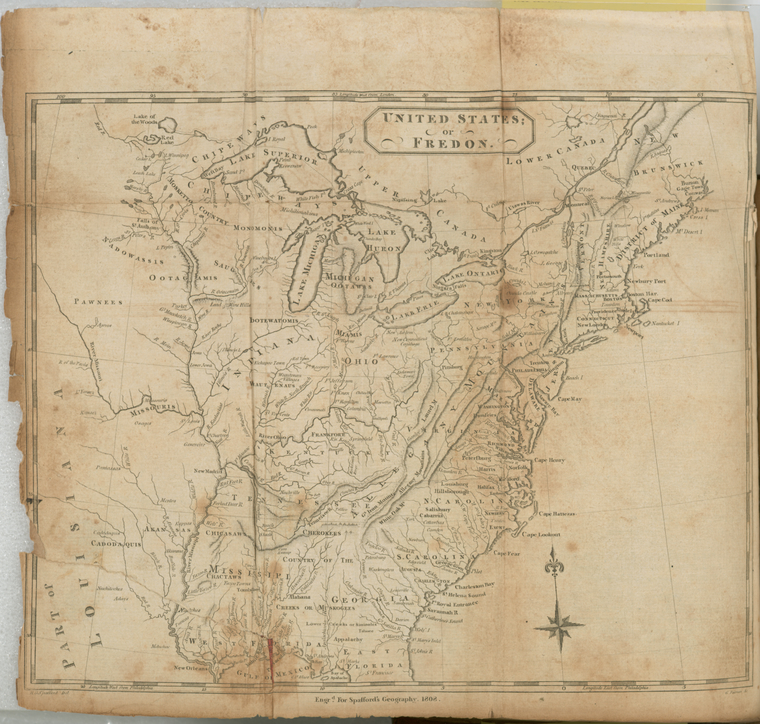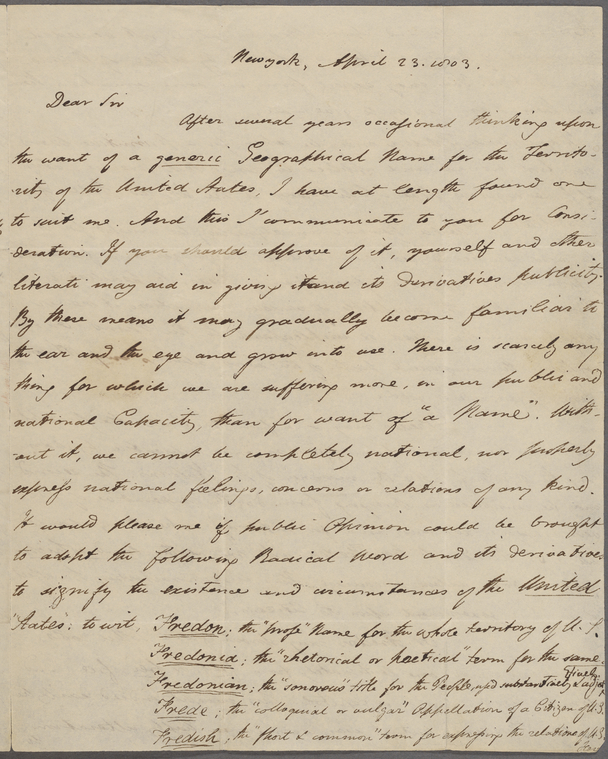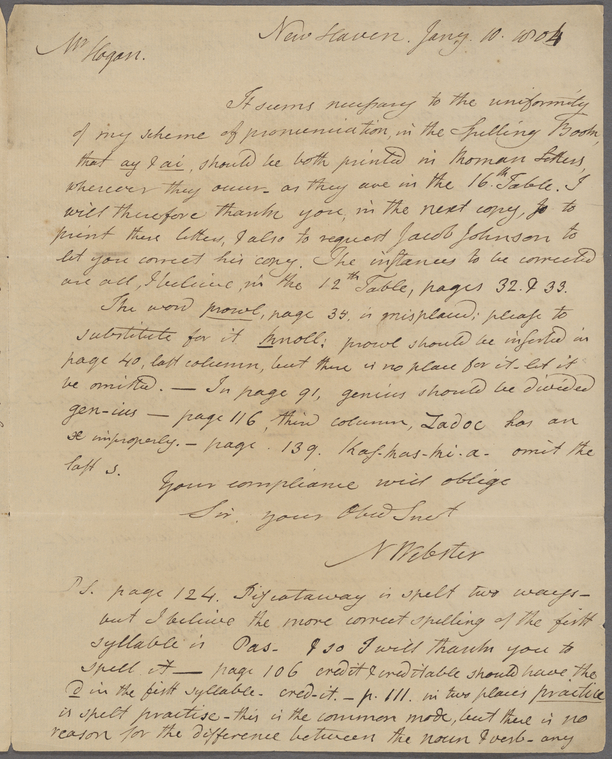The United States of Fredonia?
“It was a great oversight” of the Constitution’s framers that they did not give the United States a “proper name.” So claimed Samuel Latham Mitchill in an 1803 broadside. A doctor by training, Mitchill not only diagnosed this problem, he also proposed a remedy. The land occupied by the United States, he suggested, should be called Fredon, or Fredonia in its more “poetical” form. The people of Fredonia would be called Fredonians or Fredes. And the adjectival form would be Fredish. Mitchill declared these various words were “sonorous,” and the whole language “rich and copious.” This Fredish language would even translate well into verse: “Their chiefs, to glory lead on/The noble sons of Fredon.”

United States of America" (1803), Early American Imprints, Series 2, no. 4267
Strange as this all sounds, Mitchill’s proposals might have succeeded. Mitchill convinced some contemporaries that he was on to something. Jedidiah Morse, who wrote the most important geography text of the period, advocated for this new “generic name” for the United States. Here Morse followed Mitchill, who dismissed “United States” as an inadequate name. It was “a political, and not a geographical title.” For Morse, Fredonia worked better than America because the latter described not just the United States, but also all of North and South America. Columbia, another possibility, simply would not sound as good as Fredonia in “all the variations, important in a generic name.”
Mitchill’s proposal even found its way into a few maps.
In April of 1803, around the time he published the broadside, Mitchill wrote to Noah Webster asking for his support. Reaching out to Webster made a great deal of sense and Mitchill had reason to be optimistic that Webster would approve of his plan. Through his Grammatical Institute of the English Language, which was the most famous textbook of its day, and later the American Dictionary of the English Language, Webster tried to Americanize the English language. His publications during the late eighteenth and early-nineteenth centuries proposed a coherent programme to systematise spelling and grammar in the United States in a way that did honour to the new nation. The fact that the last sentence looks strange is testament to his success.
Webster was interested in language for many of the same reasons Mitchill was interested in renaming the United States. He believed that language was at the centre center of national identity. Mitchill seized on these congruities when he wrote to Webster. Without a new generic name, Mitchill argued, “we cannot be completely national, nor properly express national feelings, concerns or relations of any kind.” It was a thoroughly Websterian argument.
But Mitchill failed to convince Webster. His belief in the connection between language and nation notwithstanding, Webster spent surprisingly little time thinking about what to call the Unite States and its people. In his dictionary, Webster defined “America” as the continent extending from the “eightieth degree of North, to the fifty-fourth degree of South Latitude”—what we call North and South America. He defined Americans as “A native of America; originally applied to the aboriginals, or copper-colored races, found here by the Europeans; but now applied to the descendants of Europeans born in America.” Likewise, he defined “Columbian” as “Pertaining to the United States, or to America, discovered by Columbus.” Webster clearly knew the limits of the more common names for the US—that neither actually described only the United States or its citizens. But he remained surprisingly unperturbed.
Webster’s indifference was probably the downfall of Fredonia. So much of what Noah Webster supported actually happened, in one form or another. His early advocacy led to the creation of state and national laws protecting copyright. His schoolbooks were the most influential of their time, and transformed elementary education in the United States. And his dictionary changed the English language in the Western Hemisphere. If anyone could have made Fredonia stick, it was Webster.
Noah Webster’s writings loom large in historians’ efforts to understand how early Fredons Americans attempted to forge a nation out of their revolution. That is because Webster was a central figure in that process. But that also meant people wrote to Webster for help and support in their nation-building projects. Webster fielded quirky proposals like Mitchill’s. He also received sober requests, such as William Cranch’s plea for Webster’s help in publishing an early edition of court reports. The digitization of Webster’s outgoing and incoming correspondence makes widely available an unparalleled resource for studying the range of ways in which Americans sought to build a nation in the wake of the American Revolution.
About the Early American Manuscripts Project
With support from the The Polonsky Foundation, The New York Public Library is currently digitizing upwards of 50,000 pages of historic early American manuscript material. The Early American Manuscripts Project will allow students, researchers, and the general public to revisit major political events of the era from new perspectives and to explore currents of everyday social, cultural, and economic life in the colonial, revolutionary, and early national periods. The project will present on-line for the first time high quality facsimiles of key documents from America’s Founding, including the papers of George Washington, Thomas Jefferson, Alexander Hamilton and James Madison. Drawing on the full breadth of the Library’s manuscript collections, it will also make widely available less well-known manuscript sources, including business papers of Atlantic merchants, diaries of people ranging from elite New York women to Christian Indian preachers, and organizational records of voluntary associations and philanthropic organizations. Over the next two years, this trove of manuscript sources, previously available only at the Library, will be made freely available through nypl.org.
Read E-Books with SimplyE
 With your library card, it's easier than ever to choose from more than 300,000 e-books on SimplyE, The New York Public Library's free e-reader app. Gain access to digital resources for all ages, including e-books, audiobooks, databases, and more.
With your library card, it's easier than ever to choose from more than 300,000 e-books on SimplyE, The New York Public Library's free e-reader app. Gain access to digital resources for all ages, including e-books, audiobooks, databases, and more.
If you don’t have an NYPL library card, New York State residents can apply for a digital card online or through SimplyE (available on the App Store or Google Play).
Need more help? Read our guide to using SimplyE.



Comments
Fredonia
Submitted by Steve Popofsky (not verified) on December 3, 2015 - 5:28pm